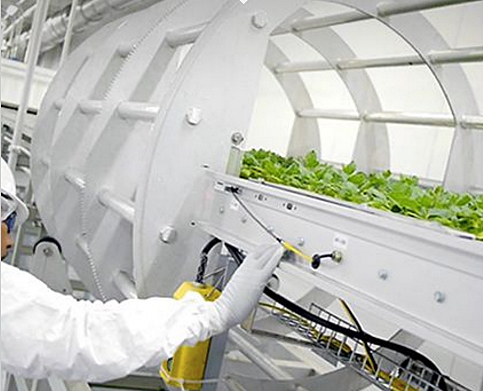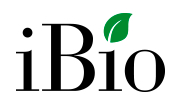iBio Expands Development Capacity for Plant-based Fibrotic Disease Therapies

 iBio, a developer of plant-based biotechnology, has announced the completion of expanded product development capacity at its subsidiary, iBio CMO, jointly owned with affiliates of Eastern Capital, for the production of pharmaceutical proteins in hydroponically-grown green plants and the large-scale manufacture of biological pharmaceutical products.
iBio, a developer of plant-based biotechnology, has announced the completion of expanded product development capacity at its subsidiary, iBio CMO, jointly owned with affiliates of Eastern Capital, for the production of pharmaceutical proteins in hydroponically-grown green plants and the large-scale manufacture of biological pharmaceutical products.
iBio is developing proprietary products for treating a range of fibrotic diseases including idiopathic pulmonary fibrosis (IPF), systemic sclerosis, and scleroderma.
The company’s lead product candidate is a therapeutic medicine currently designated as IBIO-CFB03 for the treatment of fibrotic diseases. The therapy is produced using iBio’s proprietary gene expression technology, and is the first such product from this program being advanced for a U.S. Food and Drug Administration (FDA) Investigational New Drug (IND) application.
 The iBio CMO expansion will enable iBio’s technologies to conduct concurrent product development work for multiple clients in a range of product classes, resulting in more efficient transitions from laboratory-level feasibility and testing through cGMP (Current Good Manufacturing Practice) production of active pharmaceutical ingredients for toxicology studies, as well as initiation of Phase 1 clinical trials.
The iBio CMO expansion will enable iBio’s technologies to conduct concurrent product development work for multiple clients in a range of product classes, resulting in more efficient transitions from laboratory-level feasibility and testing through cGMP (Current Good Manufacturing Practice) production of active pharmaceutical ingredients for toxicology studies, as well as initiation of Phase 1 clinical trials.
“An important consideration for many of our clients … is our ability to save them time during critical stages of their proprietary product development programs,” Dr. Barry Holtz, iBio’s senior vice president of product development and manufacturing, said in a press release.
“We can provide definitive technical answers faster than conventional mammalian cell-based systems and then move directly into larger scale production. This avoids engineering and re-engineering mammalian cell lines and dealing with the scale-up issues associated with traditional … cell production.”
Company says new fibrosis drug has breakthrough potential
 iBio, in collaboration with Dr. Carol Feghali-Bostwick of the Medical University of South Carolina, is developing a proprietary therapeutic product initially focused on the treatment of systemic scleroderma, but with potential broader applications in treating IPF and other fibrotic diseases.
iBio, in collaboration with Dr. Carol Feghali-Bostwick of the Medical University of South Carolina, is developing a proprietary therapeutic product initially focused on the treatment of systemic scleroderma, but with potential broader applications in treating IPF and other fibrotic diseases.
In July, the U.S. Patent and Trademark Office issued a new patent to iBio covering the company’s rights for use of endostatin-related peptides with therapeutic potential for treating several fibrotic diseases, including scleroderma and IPF, developed between iBio and Feghali-Bostwick.
The company notes that preclinical data for its IBIO-CFB03 candidate indicates the drug may have the ability to stop or even reverse the progress of fibrosis, referencing data published by Feghali-Bostwick in 2012 demonstrating that specific endostatin-derived peptides are effective for both inhibition and reversal of fibrosis in preclinical mouse models of fibrosis as well as in human skin.
The drug’s active pharmaceutical ingredient is produced using patented iBio technology.
iBio is also involved in the development of several vaccines and therapeutic candidates for clients, and the company is significantly expanding its commitment to the monoclonal antibody product category of medicines.
The iBio CMO pilot plant expansion will enable the company to remain fully committed to its own proprietary anti-fibrosis therapeutics program while participating in promising programs being developed by its clients.
iBio CMO has entered into a 35-year operating lease with Eastern Affiliates for a 139,000-square-foot life sciences building previously owned by Caliber Biotherapeutics, located on 21 acres in Bryan, Texas. Several key former employees of Caliber have joined iBio CMO.
iBio and Caliber have worked closely together since 2012, collaborating on a range of projects. The Bryan facility, now owned by the Eastern Affiliates, is located on a technology corridor abutting the Texas A&M University campus, home to TAMU’s National Center for Therapeutics Manufacturing, a leading center for research in the production of vaccines and protein therapeutics.
 The iBio CMO multiproduct facility includes laboratory and pilot-scale operations as well as large-scale automated hydroponic systems capable of growing over four million plants as “in process inventory” and producing over 300 kilograms of finished therapeutic protein per year.
The iBio CMO multiproduct facility includes laboratory and pilot-scale operations as well as large-scale automated hydroponic systems capable of growing over four million plants as “in process inventory” and producing over 300 kilograms of finished therapeutic protein per year.
This translates into more than a half million doses per year of a typical therapeutic antibody and approximately 50 million vaccine doses every three weeks. The facility’s capacity can be doubled by adding additional plant growth equipment. iBio CMO’s lease also includes the right to develop another facility on the balance of the leased property that would have the effect of quadrupling capacity from the current level.
For more information, visit http://www.ibioinc.com








